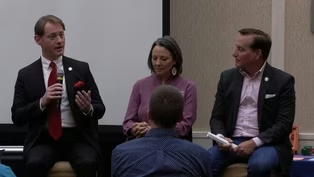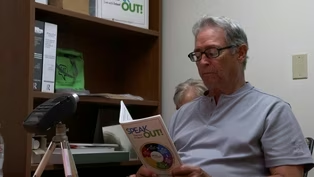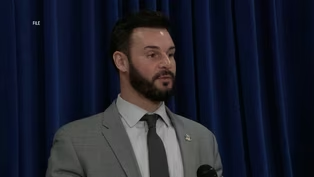
Treating and Preventing West Nile Virus
Clip: Season 4 Episode 70 | 3m 30sVideo has Closed Captions
Infectious diseases expert talks about rise in West Nile Virus cases in Kentucky.
This year, there have been 19 cases of the West Nile Virus across the state. The Lexington-Fayette County Health Department reported a fourth case in September, while the Department of Health and Wellness in Louisville reported 9 cases of the West Nile Virus. To learn more about the West Nile Virus, we spoke to an infectious disease specialist.
Problems playing video? | Closed Captioning Feedback
Problems playing video? | Closed Captioning Feedback
Kentucky Edition is a local public television program presented by KET

Treating and Preventing West Nile Virus
Clip: Season 4 Episode 70 | 3m 30sVideo has Closed Captions
This year, there have been 19 cases of the West Nile Virus across the state. The Lexington-Fayette County Health Department reported a fourth case in September, while the Department of Health and Wellness in Louisville reported 9 cases of the West Nile Virus. To learn more about the West Nile Virus, we spoke to an infectious disease specialist.
Problems playing video? | Closed Captioning Feedback
How to Watch Kentucky Edition
Kentucky Edition is available to stream on pbs.org and the free PBS App, available on iPhone, Apple TV, Android TV, Android smartphones, Amazon Fire TV, Amazon Fire Tablet, Roku, Samsung Smart TV, and Vizio.
Providing Support for PBS.org
Learn Moreabout PBS online sponsorshipThe Kentucky Department for Public Health reported only 11 cases of mosquito borne illnesses from 2003 to just last year.
But this year there have been 19 cases of the West Nile virus across the state.
The Lexington and Fayette County Health Department reported a fourth case in September, while the Department of Health and Wellness in Louisville reported nine cases of the West Nile virus.
To learn more about the West Nile virus, we spoke to an infectious disease specialist for tonight's medical news.
The West Nile virus is a virus that humans get from mosquitoes, and those mosquitoes get infected because they bit a bird that was infected.
West Nile virus is transmitted from human to human.
It's only from mosquito to human.
So any zoonotic illness, which is an illness that comes from an animal, so a very complex ecosystem, complex ecology.
And oftentimes when there's a change in either the areas where animals live or the life cycle of the animals, then we'll see changes in the amount of cases.
Right now, as the climate and the weather changes, the mosquito habitat changes, the mosquito life cycle changes and exposure of mosquitoes to humans can also change.
And so we very well may be seeing more cases of West Nile virus because of the changing ecosystem and changing climate.
Most of the time when someone gets West Nile virus, they are asymptomatic, which means they don't have symptoms, they don't get ill.
About one in five people will get or feel muscle aches and fevers and they'll just feel unwell.
And then an even smaller percentage of those people, maybe about 1% of people who are infected, will get central nervous system disease.
We call that West Nile virus, and satellite is or sometimes meningitis, which is inflammation of the brain.
And that can cause confusion or coma or really bad neurologic symptoms.
And the people that are at risk for that are typically older people or immunocompromised people.
So prevention of transmission of disease is really key.
And the way to do that is protect yourself from mosquito bites, which isn't always that easy to do, especially this time of year.
And so the best thing to do is during dawn or dusk when the Culex mosquito starts to bite, you either cover up any exposed skin, or if you can't do that because it's too hot, you can wear mosquito repellent, something like DEET, at least 30% or picaridin.
And one other way to prevent infection is also try to reduce your exposure to mosquitoes in other ways, such as getting rid of standing water on your property.
If you have buckets of water, that's a breeding ground for mosquitoes.
So West Nile virus, like many other viruses, is, does not have a specific treatment.
We mostly give what's called supportive care, which means making sure that you're well hydrated, well nourished, making sure your fever is under control, making sure that your neurologic symptoms are under control.
But there's no medicine that directly fights the West Nile virus.
It's not something that the general public needs to panic about or anything.
But just to be aware about that information, according to the recent alert from the Kentucky Department for Public Health, one person has died from the West Nile virus in Kentucky
Lexington Conference Looks at Preventing Human Trafficking
Video has Closed Captions
Clip: S4 Ep70 | 3m 41s | National conference on human trafficking and domestic violence held in Lexington. (3m 41s)
Program Helps Parkinson’s Patients Speak Out
Video has Closed Captions
Clip: S4 Ep70 | 3m 25s | Free therapy program helps those with Parkinson's improve their quality of life. (3m 25s)
State Lawmaker to Become Jefferson County Clerk
Video has Closed Captions
Clip: S4 Ep70 | 2m 34s | Senate Minority Whip, David Yates, appointed as interim Jefferson County Clerk. (2m 34s)
Providing Support for PBS.org
Learn Moreabout PBS online sponsorship
- News and Public Affairs

Top journalists deliver compelling original analysis of the hour's headlines.

- News and Public Affairs

FRONTLINE is investigative journalism that questions, explains and changes our world.












Support for PBS provided by:
Kentucky Edition is a local public television program presented by KET


